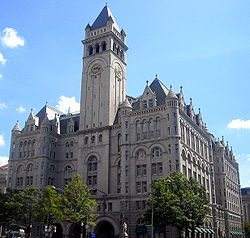
Nancy Hanks (NEA)
Encyclopedia

National Endowment for the Arts
The National Endowment for the Arts is an independent agency of the United States federal government that offers support and funding for projects exhibiting artistic excellence. It was created by an act of the U.S. Congress in 1965 as an independent agency of the federal government. Its current...
(NEA). She was appointed by President Richard M. Nixon and served from 1969 to 1977, continuing her service under President Gerald R. Ford. During this period, Hanks was active in the fight to save the historic Old Post Office building in Washington, D.C.
Washington, D.C.
Washington, D.C., formally the District of Columbia and commonly referred to as Washington, "the District", or simply D.C., is the capital of the United States. On July 16, 1790, the United States Congress approved the creation of a permanent national capital as permitted by the U.S. Constitution....
from demolition. In 1983, it was officially renamed the Nancy Hanks Center, in her honor, and today houses the offices of the NEA, among others.
Early life
Nancy Hanks was born in Miami Beach, FloridaMiami Beach, Florida
Miami Beach is a coastal resort city in Miami-Dade County, Florida, United States, incorporated on March 26, 1915. The municipality is located on a barrier island between the Atlantic Ocean and Biscayne Bay, the latter which separates the Beach from Miami city proper...
on December 31, 1927. She was a distant cousin of Nancy (Hanks) Lincoln, the mother of President Abraham Lincoln. She moved to Montclair, New Jersey
Montclair, New Jersey
-Demographics:As of the census of 2000, there were 38,977 people, 15,020 households, and 9,687 families residing in the township. The population density was 6,183.6 people per square mile . There were 15,531 housing units at an average density of 2,464.0 per square mile...
, while she was in high school.
Hanks attended Duke University
Duke University
Duke University is a private research university located in Durham, North Carolina, United States. Founded by Methodists and Quakers in the present day town of Trinity in 1838, the school moved to Durham in 1892. In 1924, tobacco industrialist James B...
where she majored in political science and was a member of Kappa Alpha Theta
Kappa Alpha Theta
Kappa Alpha Theta , also known as Theta, is an international fraternity for women founded on January 27, 1870 at DePauw University, formerly Indiana Asbury...
sorority.
Career
Hanks was the first woman to serve as the Chairman of the NEA and her political skills enabled her to increase NEA’s funding from US$8 million to US$114 million over her eight-year tenure. An act of the United States Congress honored Hanks by designating the newly renovated Old Post Office in Washington, D.C. The Nancy Hanks Center, in recognition of her enduring contributions to the arts.The American Association of Museums established an award in her honor. The award recognizes a specific achievement that has benefited either the honoree’s home institution or the museum field in general. The cited achievement may be in any area of a museum’s operation: administration, exhibitions, education, public relations, registration, collections management, or development. Alternatively, the accomplishment may benefit the museum field generally (for instance, a development plan, membership plan, exhibition design, or collection policy that can serve as a model for other museums). Nominees for this award must have less than ten years in the museum field.
In 1983, Nancy Hanks died of cancer at the age of 55.

